
Photo Credit: paurian via Compfight cc
There is fascinating new research on how our body language actually shapes who we are. We’ve known for a long time that our body language shapes how others see us, but this research shows how our own body language shapes who we are down to the chemical levels in our own brain.
For example, if you sit or stand in a certain way, you will have more confidence and be able to better handle stress.
The research was done by Amy Cuddy who is a social psychologist at the Harvard Business School. As part of her research, she conducted an experiment where she asked people to assume a high-power pose or a low-power pose for two minutes. She then tested their willingness to take risks and evaluated their body chemistry.
Some of the poses are pictured below. Notice how the high-power poses stretch the body out (much like animals gearing up for a fight), and the low-power poses make the body smaller.
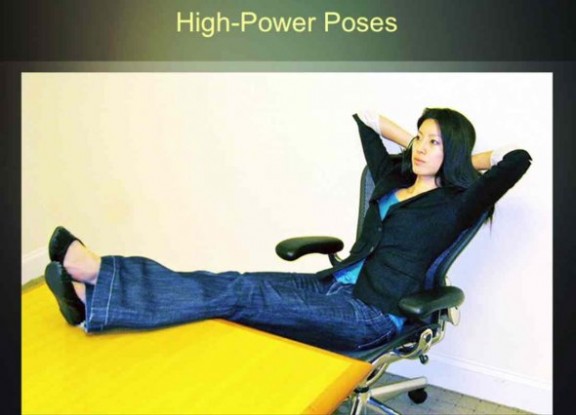
photo credit: Amy Cuddy
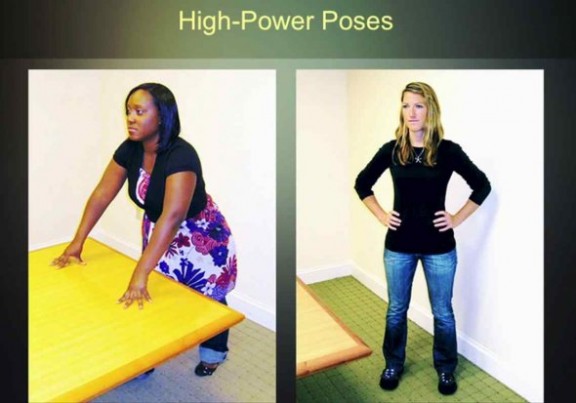
photo credit: Amy Cuddy
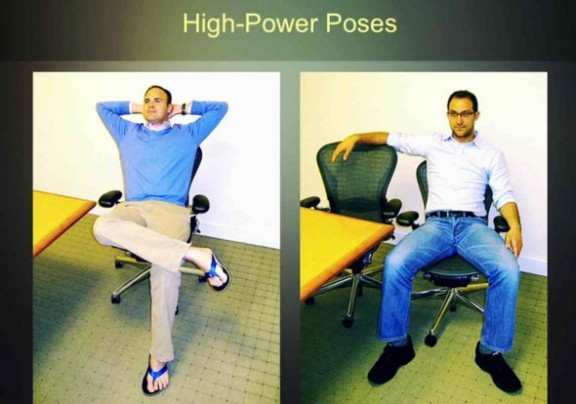
photo credit: Amy Cuddy
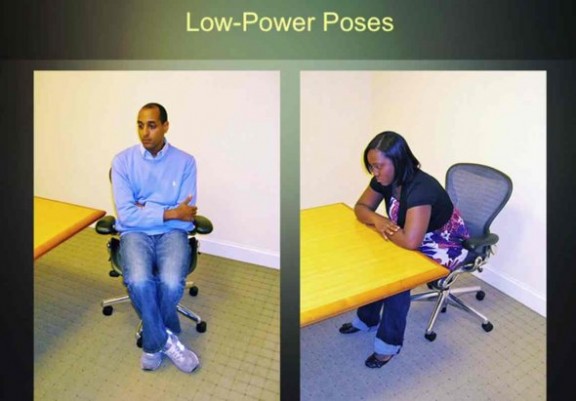
photo credit: Amy Cuddy
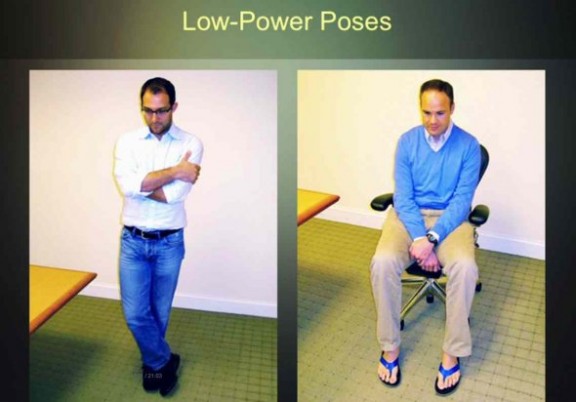
photo credit: Amy Cuddy
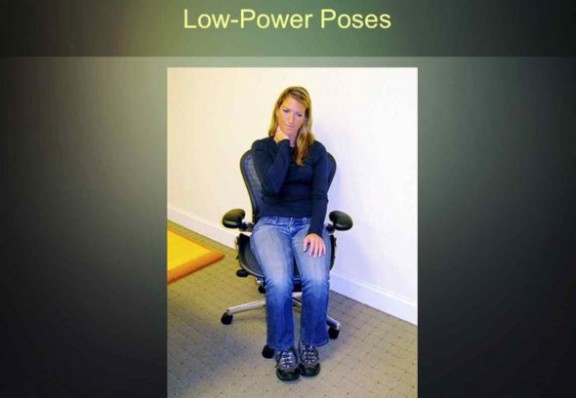
photo credit: Amy Cuddy
The results were incredible. After just two minutes of holding these poses, here’s what she found:
– the high-power posers’ willingness to take risks soared while it shrank with the low-power posers
– the testosterone levels of the high-power posers rose 20% while it fell 10% with the low-power posers – when our testosterone levels are high, we’re more likely to seek out new challenges
– the cortisol levels of the high-power posers fell sharply while it rose in the low-power posers – when our cortisol levels are low, we can better handle stressful situations
It’s easy to see how this would be a benefit to us. Holding ourselves in a more confident way (i.e. a power pose) will actually help us take on new challenges and handle stressful situations better.
Cuddy then went on to test more specifically how holding a high-power pose for a few minutes could change our lives in a meaningful way.
She conducted another experiment where she again asked people to assume a high-power pose or a low-power pose for two minutes. This time, however, they followed it up with an intense mock job interview.
The non-partial judges, unaware of the specifics of the experiment, overwhelmingly wanted to hire the individuals who had just posed in a high-power pose before the interview. The judges actually said it wasn’t so much what these people said in the interviews, but it more about their “presence.”
This is significant if you think about how people usually wait to be called in for an interview. It’s often in a very closed, low-power position like the individuals pictured below.

photo credit: Amy Cuddy
Now, you probably don’t want to be putting your feet up on the table waiting for your interview, but you could stand, sit up straight, or even go to the bathroom and secretly pretend you’re superman as Cuddy suggests!
In her research, Cuddy concluded:
“Our bodies shape our minds, our minds shape our behavior, our behavior changes our outcomes.”
Our body language not only shapes how others see us, but it actually shapes who we are down to the chemical levels in our own brain.
What do you think? Will you stand like superman before your next big meeting, pitch, or job interview? According to the research, it will make a big difference.
If you’re interested in this topic, I highly recommend watching Amy Cuddy’s Ted Talk on the topic.



Fascinating. I am highly intrigued by body language and often enjoy “people watching” for that reason. 🙂 I was slightly surprised how my own perception of the models in the photographs above changed as their positions changed. I looked at all the photos once and had immediate reactions to what I thought of the individuals. When I realized the models had posed for both the high power and low power photographs, I noticed how I “judged” the high power posed people to be more confident and capable. Although I am already aware of body language, this post was a good reminder to what my body language is conveying to others. I am aware of specific times I wanted to appear confident and did not, simply because of my stance. I’m going to test this out this week. 🙂
Alana,
The more I learn about body language and the more I just generally observe all the non-verbal clues people give, the more I realize how much is communicated without a word ever being spoken. It’s very fascinating.
That’s so interesting what your initial reactions to the different poses were. That’s testament to the power of our non-verbals! Thanks for the input.
Awesome Michael! One of the “principles” I suggest to clients trying to lose weight is what I call, “act as if” – I suggest they begin to behave as if they were already slim and fit. This fits perfectly and I am fascinated by the research! I will definitely listen to the TED talk! Great post – and yes, I can say from personal experience, I feel different when my body language matches my desired attitude!
Ann,
Makes me think of “fake it till you make it.” Or, as Amy Cuddy in her Ted Talk puts it, “fake it till you become it.”
Thanks for your thoughts!
The pictures of the people in the low power postures make me sad…I can tell you I’d never hire anyone that looked like that! I hadn’t seen this research, thanks for sharing it!
Same here, Tom. I wouldn’t want to hire anyone looking so down and out either!
Great Post! I used to work for a guy that wouldn’t even interview a candidate if they walked a certain way! Your post is a great reminder of how we make an impression on others without even talking.
Thanks, Luke. First impressions are a big deal and I think they really do tell a lot. Thanks for your input!
I’m always very wary of short term studies and the “demonstrated” benefits.
However! I do believe posture is very important!
Does anyone have suggestions for how to maintain good posture? I revert to hunching over as the day moves on. I’ve seen those “man-bras” that you can get thru Sky Auction Magazine. They’re like $30-50. I’m skeptical if they work.
Alex, I too believe posture is very important. I think there are two things that go into it. One, our muscles need to get stronger and more used to holding ourselves that way. And two, we need to develop good posture as a habit, then it’s second nature and we don’t need to think about it so much. I’d rather maintain good posture that way than by strapping any sort of support on.
I tried to continually remind myself but I seem to revert
Hey, you can always try the “man-bra!” They have to come up with a better name for that.
Great article, Michael!
I always stand when someone new enters the room and especially when introductions are being made. I quickly assume the superman stand (with less elbows).
I ran my own company for 7 years and always had my doubts when the interviewee maintained poor posture.
James, that’s you keeping chivalry alive. I like it! And that’s way you’re such a great dad for your daughters. 🙂
As a business owner, I can easily see the benefits of observing body language, including posture, when hiring. For sure.
VERY interesting! I often find myself in those “low power” poses. I’m going to have to work on that. Thanks for bringing this to my attention!
Sure thing, Ryan. I’ve been much more aware of my posture since learning of this study and have really been enjoying standing/sitting with better posture.